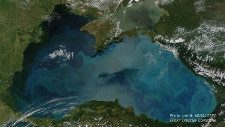The Role of Science Diplomacy: A Historical Development and International Legal Framework of Arctic Research Stations Under Conditions of Climate Change, Post-Cold War Geopolitics and Globalization/Power Transition
Sandra Cassotta, Rasmus Gjedssø Bertelsen, Michael Evan Goodsite, Lize-Marie van der Watt and Halldor Johannsson
The Arctic is undergoing transformation, where three important drivers are climate change, post-Cold War geopolitics and globalization/power transition from the rise of China. This transformation defines the nexus between science diplomacy, geopolitics, law and globalization under climate change, which is shaping the future of the Arctic and will bring considerable opportunity at national, regional and global levels. Research infrastructures (research stations both military and non-military, observation and monitoring networks) are opening access and data to new Arctic and non-Arctic players. Additional logistics hubs than those already existing are and should be established. Countries are sustaining and building new research as well as search and rescue bases/stations. Stations can be used as indicator of this transformation as well as their implications to improve cooperation, engage in multilateral rather than unilateral actions to protect the Arctic infrastructures and to improve military capabilities. These actions have started to attract also non-Arctic actors, such as China and the European Union (EU), which are developing new policies. Stations may not be developed and maintained only not only for the purpose of the scientific understanding of climatic and environmental impacts but also for function as entities that legitimize national or sovereign claims. At the nexus are the scientists that utilize the research bases and their international colleagues. Arctic/Northern bases are primarily military for historical reasons and for reasons of logistics and expertise, as historically indicated through the American presence in Alaska. This is not the same as saying that the bases are militarized—or part of some national militarization strategy in the Arctic. New steps to identify the role of stations at national, regional and global levels are needed. In this essay, we explore the implications and opportunities for these stations to act as pivots between scientific and geopolitical issues. We argue that where there is scientific collaboration, there is less risk of military conflict and that the Arctic is not “militarized” based on the international politics and science diplomacy of the Arctic.
Related Publications
-
China as a Black Sea Actor: An Alternate Route
China’s international role has expanded rapidly in the last decades, and the Greater Central Asian region, Europe, and the Middle East, to which the Black Sea region (BSR) connects, are […]
-
ISDP Annual Report 2023
ISDP’s Annual Report for the year 2023. We look back on 2023, a year in which tensions and conflicts captured the strategic space in ISDP’s focus areas, making headlines around […]

